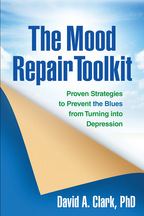The Mood Repair Toolkit
Proven Strategies to Prevent the Blues from Turning into Depression
David A. Clark
Paperbacke-bookprint + e-book
Paperback
orderJuly 28, 2014
ISBN 9781462509386
Price: $14.95 292 Pages
Size: 7⅜" x 9¼"
The practical tools can be downloaded and printed in PDF format.
“Excellent material, with a menu of options for those who suffer from the blues.”

—Library Journal
“It provides readers with tools and techniques to help repair mood, use mood enhancement strategies, and learn step-by-step methods for regulating mood. Given that depression is a common psychological disorder, the book is quite timely and insightful on many levels. The author is a well-known clinician in the field….Individuals suffering from depression will find this book extremely beneficial and worthwhile. Family members as well as clinicians will certainly benefit from the excellent tools and techniques.”

—Doody's Review Service
“Dr. Clark is an international figure in the field of cognitive therapy. This book brings the latest science and therapeutic wisdom to guide you to help yourself when dark moods threaten to overwhelm you. It is full of practical, trustworthy strategies you can begin to use today. I thoroughly recommend it.”

—Mark Williams, DPhil, coauthor of The Mindful Way Workbook
“I'm always looking for resources that I can recommend to my patients. You don't need a background in psychology to understand and use The Mood Repair Toolkit. I especially like the way Dr. Clark discusses the evidence for each tool before providing practical suggestions for applying it. I have already tried and recommended several of the book's strategies, including the very helpful tips for staying on track with exercise.”

—Carmen Stuart, MD, family physician
“Dr. Clark has written a clear and straightforward guide to repairing mood and avoiding depression. Drawing on the best current science, this book takes you on a journey to enhanced self-understanding, joy, and fulfillment. You'll learn practical skills and new ways of thinking and feeling that will be helpful for a lifetime.”

—Nikolaos Kazantzis, PhD, Cognitive Behavior Therapy Research Unit, School of Psychological Sciences and Turner Institute for Brain and Mental Health, Monash University, Australia
—Library Journal
“It provides readers with tools and techniques to help repair mood, use mood enhancement strategies, and learn step-by-step methods for regulating mood. Given that depression is a common psychological disorder, the book is quite timely and insightful on many levels. The author is a well-known clinician in the field….Individuals suffering from depression will find this book extremely beneficial and worthwhile. Family members as well as clinicians will certainly benefit from the excellent tools and techniques.”
—Doody's Review Service
“Dr. Clark is an international figure in the field of cognitive therapy. This book brings the latest science and therapeutic wisdom to guide you to help yourself when dark moods threaten to overwhelm you. It is full of practical, trustworthy strategies you can begin to use today. I thoroughly recommend it.”
—Mark Williams, DPhil, coauthor of The Mindful Way Workbook
“I'm always looking for resources that I can recommend to my patients. You don't need a background in psychology to understand and use The Mood Repair Toolkit. I especially like the way Dr. Clark discusses the evidence for each tool before providing practical suggestions for applying it. I have already tried and recommended several of the book's strategies, including the very helpful tips for staying on track with exercise.”
—Carmen Stuart, MD, family physician
“Dr. Clark has written a clear and straightforward guide to repairing mood and avoiding depression. Drawing on the best current science, this book takes you on a journey to enhanced self-understanding, joy, and fulfillment. You'll learn practical skills and new ways of thinking and feeling that will be helpful for a lifetime.”
—Nikolaos Kazantzis, PhD, Cognitive Behavior Therapy Research Unit, School of Psychological Sciences and Turner Institute for Brain and Mental Health, Monash University, Australia



